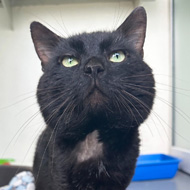Abandoned donkeys rescued by Donkey Sanctuary
Darcy's hooves were uncared for, and Kallie was suffering from a leg wound.
Two donkeys, found abandoned and roaming in a field in Suffolk, have been rescued and taken for veterinary care by the Donkey Sanctuary.
Kallie and Darcy, aged seven and six, were reported to the Donkey Sanctuary in August after being seen roaming around a large field.
When donkey welfare advisers Jess Bush and Mark Kerr arrived on the scene the donkeys appeared nervous, and it was unclear whether they had been handled. The grass in the field was very long, so they could not assess the condition of their hooves from a distance.
Due to the size of the field, approximately 20 acres, it was challenging for the rescuers to get close enough to make contact with the donkeys. There was also no hardstanding or shelter where they would be able to handle them.
The grass in the field was lush, which raised the welfare adviser’s concerns about the donkeys’ diets. Dietary problems from too much sugary grass, including obesity, can lead to laminitis, a painful condition affecting hooves.
Under the Control of Horses Act 2015, the landowner had to try and locate the owners of the donkeys before the Donkey Sanctuary could act. After no owners were find, the landowner had the legal right to make arrangements for the donkeys’ welfare.
After the donkeys were moved to a smaller field, donkey welfare advisers were able to examine them more closely.
Both the donkeys’ feet were found to be extremely overgrown. Darcy’s hooves were chipped and cracked, with her front hooves curling at the toe, while Kallie had a wound on her leg which put her at risk of fly strike.
The donkeys remained nervous, so the Donkey Sanctuary partnered with World Horse Welfare to utilise specialist equine handling pens to manage them.
With World Horse Welfare’s support, the Donkey Sanctuary was able to handle the donkeys in a smaller space, before moving them to a holding base for further treatment. They are now comfortable on their feet and much healthier, but still wary around humans.
Jess Bush, the donkey welfare adviser who was first on the scene, said: “I recently saw Kallie and Darcy and it was amazing to see how far they have come thanks to the dedication and care provided by their grooms.
“I hope they continue to lead a happy, healthy life – either in a loving Donkey Guardian home or at one of our sanctuary farms.”
Image © Shutterstock



 The RSPCA has revealed that it can take three times longer to rehome black cats compared to other cats.
The RSPCA has revealed that it can take three times longer to rehome black cats compared to other cats.